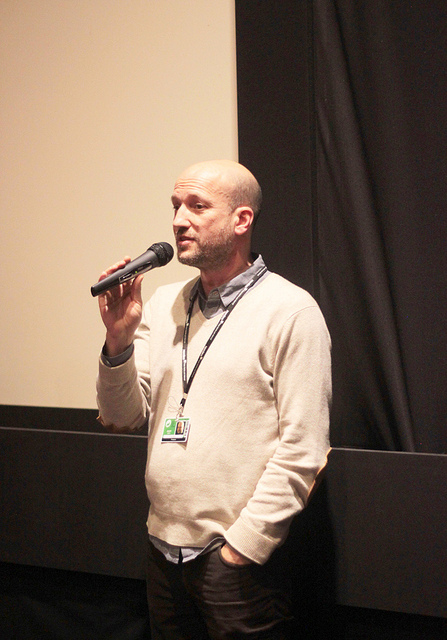Interview: Luc Déry
Lugemisaeg 7 minLuc Déry is one of Canada’s most successful film producers out there. With titles such as “Incendies”, “Monsieur Lazhar”, “Inch’Allah” and “Whitewash” under his belt he has a front row seat to the current film revolution happening in Canada. Andra Gheorghiu had the chance to catch up with him to try and understand more of what is happening in Canada right now and how come so many young filmmakers from the region seem to be finding it easier to break through to the international scene.
There are some interesting young Canadian directors attracting attention in the festival circuit. How do you think it happened and what impact does it have on the local scene?
It’s a great time for Canadian cinema; it’s a great time for cinema in Quebec in particular. Canadian cinema has travelled all over the world thanks to David Cronenberg and Atom Egoyan. Yet it comes and goes in different waves – in the 1980’s the films of Denys Arcand were in major festivals and competitions and then for a while it wasn’t happening at all. Right now there are ten directors I could name that have some type of following around the world, that have a chance of getting into Cannes or Berlin, or Venice, or Sundance. Why? I think that if I would have to name one thing it would be that 20 years ago we went back to making short films and a lot of things were organized for short films to get some type of distribution and for people to see them. A couple of short film festivals became very popular at that moment. A thing called the Kino Movement started with a lot of young filmmakers deciding to do short film with no financial means, they kind of provoked themselves into making a film every month and showing it in these gatherings. And then the more official industry decided to follow and to put more money in short films. A lot of people we see nowadays making feature films, Denis Villeneuve or Denis Côté, come from that world, they started by doing short films. Xavier Dolan not so much because he did his first feature when he was like 20 years old or something, he’s a bit of a whiz kid. It’s a group of talented film directors and right now we have a chance of being taken more seriously on the international front and people are waiting for our films, which get sold and get distributed around the world. There’s a sort of domino effect: people want to see our films, so we have slightly better means to make them.
Do you think there is a connection between these directors? Could they maybe even form a new movement?
I think it’s too soon to say. I mean, one interesting thing is that right now there are 4-5 Quebec filmmakers that made films in Hollywood within either the independent or studio system, and these are like major films. “Prisoners” by Villeneuve is getting serious Oscar talks for Jake Gyllenhaal and Hugh Jackman; “Dallas Buyers Club” with Matthew McConaughey is directed by Jean-Marc Vallée. Philippe Falardeau (with whom we did “Monsieur Lazhar”) just finished doing a film in the US – a very political story about young African kids migrating to the US, which is not out yet. There’s a very commercial film coming out these days called “Delivery Man” which is a remake of a Quebec film called “Starbuck”, which was a big success at home, but a big success in Europe and the US as well. So what’s really interesting is that not all the filmmakers we’re talking about can keep doing films in the US. It’s an interesting challenge is to see if these filmmakers will be coming back to making Canadian films in the future.
How did your work as a producer change in this context?
We sometimes try to co-produce films with Europe or with foreign countries and we’re always looking for our films to sell internationally. We have our films travel before they are released in Canada, to give them a profile before they’re released at home. The big difference is that when we talk about our projects and when we talk about our upcoming films, people know the filmmakers we’re talking about and people know when we say we produced “Incendies” and “Monsieur Lazhar”. People not only have heard about the films, but most likely will have seen them and liked them and more often than not these films have been released in their countries. Of course they can’t be released everywhere in the world and they can’t do well everywhere, so that’s the big difference with a young filmmaker. Since we produced “Incendies” and “Monsieur Lazhar”, people will think maybe this is the new Denis Villeneuve, or this is the new Philippe Falardeau, or the next Xavier Dolan. The expectations are there and people are excited to see our new films. I’m talking as a producer, but I think it’s the same for almost all of Quebec’s producers and directors now: Denis Côté is a good example and the younger directors like Maxime Giroux and Stéphane Lafleur. The latter we have worked with – his first film was in Venice, his second film was in Berlin – these are more difficult films, these are not films that get theatrical releases, these are films that get good festival exposure.
What part did the explosion of the Toronto Film Festival play in this change?
The great thing about Toronto is that it has 250 new features, almost all premieres. Cannes is like 80-90 every year, Venice about the same. In Cannes you have the market which is another group of feature films that you can see as a distributor. European producers and sales agents prefer to come to Toronto rather than go to Venice. I think the audience there are cinephiles, very generous and they react like an American audience. There’s one thing I read somewhere that the Americans like their films to premiere in Toronto because Toronto – even though it’s in Canada – reacts more closely to a typical American audience than American audiences. I don’t know why, but if a film works in Toronto, there’s a good chance it will work in the US as well.
What part did Hollywood play in this growth of Canadian cinema? Did it help it or suppress it?
What it does is that it makes it possible for some countries to fabricate films for Canadian crews to work on, they come and do post-production in Canada. A lot of big studio films come and shoot in Canada. It makes our technicians even better because they work a lot, it makes them more expensive because they make a lot of money on these films. So that’s a bit detrimental to our industry. I think our special effects have become incredibly good. It’s very interesting for us as potential co-producers on European films or even as partners on American films, because we can do special effects and post-production and we have good sound facilities as well. I think we don’t often have money to do special effects on films, but we do it more and more. “Enemy”, the film we did, we co-produced this Denis Villeaneuve film with a Toronto-based company and the special effects in that film are phenomenal.

